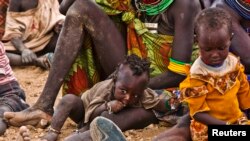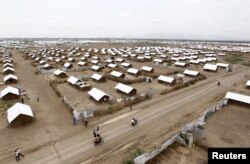Last year, aid agencies and the Kenyan government set up a new settlement for refugees in the northwestern town of Kalobeyei. The United Nations refugee agency (UNHCR) made a point of saying that Kalobeyei would not be a refugee camp. Instead, it would be an "integrated community," where refugees and local residents could do business together, live in harmony and access services offered by UNHCR through local partners.
But for Galgalo Arero, an Ethiopian refugee and father of three, the real Kalobeyei is very different than the dream.
"When they brought us here, we were told that the place would be like a community village with many development projects, a school, clinic, market and almost everything close by," he told VOA's Horn of Africa Service.
Instead, he says, the nearest market is about 24 kilometers (15 miles) away. The nearest primary school is 16 kilometers (10 miles). The distances are far too long to cover by foot.
"We pay between 200 and 300 Kenyan shillings to go to market on a motorbike. [But] that is not possible during the rainy season," he said.
Clean water
Water is also a serious issue, says another Kalobeyei resident, Abdul Aziz.
"We get water once a week by water truck, sometimes [every] two weeks," he said. "Sometimes they say the truck is damaged and we don't get water at all. For sanitation, seven families use one latrine."
VOA learned of Kalobeyei's isolation and supply problems from contacts in Nairobi and then spoke to seven residents at the site. The residents say the site lacks the most basic of services, making it hard for them to survive.
Funded by the European Union, Kalobeyei sits on 1,500 hectares of land donated by the host community, Turkana County. It was built to relieve crowding at the Kakuma refugee camp, about 30 kilometers to the east. According to the most recent UNHCR report, it hosts about 36,000 refugees who come from South Sudan, Ethiopia, Uganda, the Democratic Republic of Congo and Burundi.
It is not clear why conditions are so dire in Kalobeyei. VOA made repeated phone calls to UNHCR and Kenyan government officials in Nairobi and Kakuma for comment, but has not received a response.
Residents note there is no UNHCR office in Kalobeyei, and say if they have an issue, they must go to the nearest UNHCR office in Kakuma or wait for a UNHCR official to visit.
Money
Residents say the promises they received in advance of moving to Kalobeyei have not been kept.
"We were told that the new settlement is a facility ready with all the basic needs," said Jamal Mohamed, an Ethiopian refugee. "Because of that, everybody sold his property. We were only allowed to carry just 18 kilograms of load with us. But when we get there, reality on the ground is totally different."
The residents receive $14 (about 1400 shillings) per month from UNHCR to buy food, he says.
"The money is added to your card. You can't cash it out. When you go to Kakuma to buy food and grains, the transportation is 200 Kenyan shillings [each way]. So out of this 1,400 shillings, you end up getting 800 to 900 shillings. That is our monthly ration," he said.
Safety
Security is another issue.
"There is not enough security to keep us safe," said Galgalo Arero. "We are on the South Sudan border, a remote part of the country. There were times we are attacked by thieves. Thieves would come with all kinds of weapons to take our properties."
As for medical care, the refugees say there is only a small Red Cross office at the site.
"If there is an emergency, there are times when the ambulance arrives after an hour or two," Aziz said.








